The Depp-Heard trial was a new low point for Twitch culture
This felt like the shame of the streaming age.
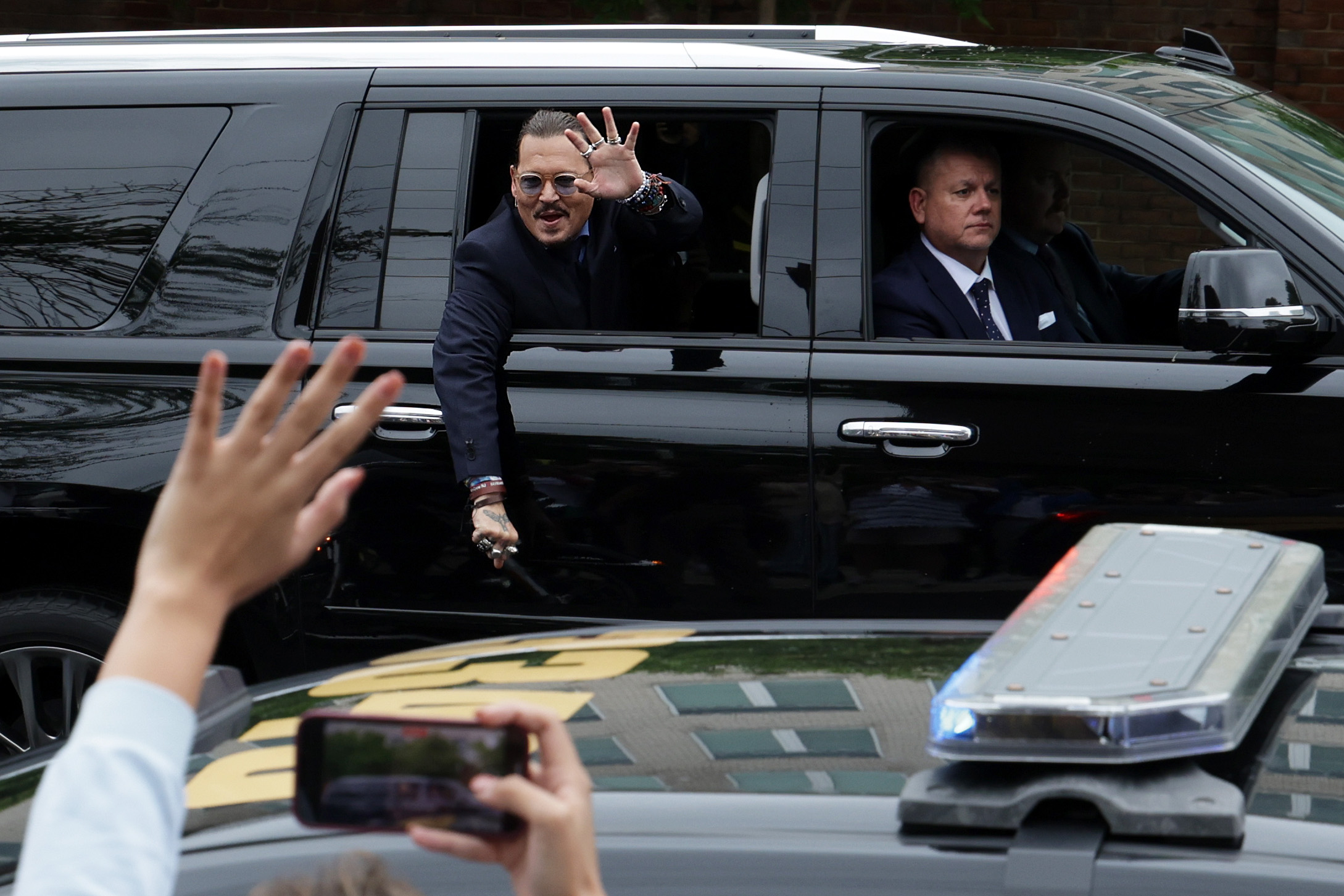
This article contains descriptions of alleged sexual violence and abuse.
I was one of 98,812 watching the conclusion of the Johnny Depp v Amber Heard trial on Twitch via popular streamer xQc's channel. Enough people to fill the largest stadium in the United States, all gathered to watch a former Overwatch pro react to a celebrity defamation case.
As Heard's lawyer makes a closing argument he describes key details in the case, at one point describing an alleged sexual assault by Depp. xQc isn't impressed. His chat's verdict is more explicit: "GIGACHAD." The lawyer describes another occasion when Depp allegedly grabbed Heard by the vagina. Again the chat verdict is instant: "hot."
The Depp versus Heard trial was one of those once-in-a-generation cases that, for no good reason, attracted vast global attention. It became omnipresent on the internet, covered obsessively on mainstream and social media, and bleeding over into spheres usually reserved for gaming. The dynamics of the latter led to the creation and dissemination of material that can be called, at best, ethically questionable, as well as what felt like the deployment of an online militia for both sides. It is perhaps one of the inevitabilities of the online age to see a high-profile defamation case, which revolved around allegations of abuse, reduced to hashtags, endless clips, and the dark art of viral editing.
What happened on Twitch is my focus here, but this platform was just one part of what was going on in a broader media and social media ecosystem. I doubt any of the platforms involved quite anticipated the level of interest this case would generate, nor were prepared for how it would manifest on their service. The three high-profile streamers I've focused on here are just the most prominent examples among thousands of individual content creators.
Twitch chat couldn't be in greater opposition to the respectful silence one is supposed to observe inside a courtroom. Perhaps for some that's part of the appeal, a chance to layer insults and hurl tomatoes in a context that would otherwise get you expelled. As one of Heard's lawyers outlines Depp's drinking habits, an xQc viewer types "PINT-DRINKING GIGACHAD."
"As Heard's lawyer discusses an incident involving drugs xQc, slurping noodles out of a takeaway box, interjects, "So no proof?""
As more evidence against Depp is produced, xQc tuts "so selective" (as if Heard's lawyer would be anything but). As the lawyer shows a picture of bruises allegedly caused by abuse, xQc pulls various faces and barks questions: "Why'd she wait?" The lawyer continues to make their case as chat adds things like "FAKE STORY OMEGALUL."There's a call-and-response rhythm underpinning the stream and the crowd, and as I watch more of it, I can see how xQc's stance echoes through the viewers.
Keep up to date with the most important stories and the best deals, as picked by the PC Gamer team.
When the courtroom silence is broken by an alarm and the judge clarifies it's a mistaken "Amber Alert" (a phone notification sent to citizens within an area of the US in cases of an abducted person) and encourages that proceedings continue, chat of course seizes on this moment for "AMBER alert lol" and a fresh round of insults aimed at Heard. As Heard's lawyer discusses an incident involving drugs xQc, slurping noodles out of a takeaway box, interjects, "So no proof?" His audience especially enjoys a close-up shot of Heard looking increasingly distressed, which results in an outpouring in chat about how "fake" her expression is. As Heard's lawyers present some of Depp's texts to Heard, xQc remarks of the counsel, "My man needs to get some bitches."
It would be easy to blame xQc for this. To call him an asshole. But the pro-Depp slant here was not at all unusual among influencers and other media and one wonders how much it is thought-through and how much it is an alignment with where a clever streamer feels the wind is blowing.
Just Chatting?
"xQc's presentation of the trial was purely as fresh content to be devoured, mocked and imitated."
I watched hours of streams in preparing this article and the mood music was nearly always in favour of Depp, who was most-often referred to as "Johnny." But that doesn't mean that Depp's testimony or behaviour is not ridiculed at times. When an audio clip of Depp moaning in some sort of delirium aboard a plane is played on xQc's stream, chat fills up with its onomatopoeic versions of the sound, things like "AUUUGHHHHHH."
xQc's presentation of the trial was purely as fresh content to be devoured, mocked and imitated. Not for the first and last time, I got the sense that this was like a soap opera where the baddies and goodies had already been decided, and we were all just waiting for the twist that would expose what they were. What xQc was doing wasn't analysis: He's not a lawyer. It was pure reaction, precisely what Twitch's "Just Chatting" category is for.
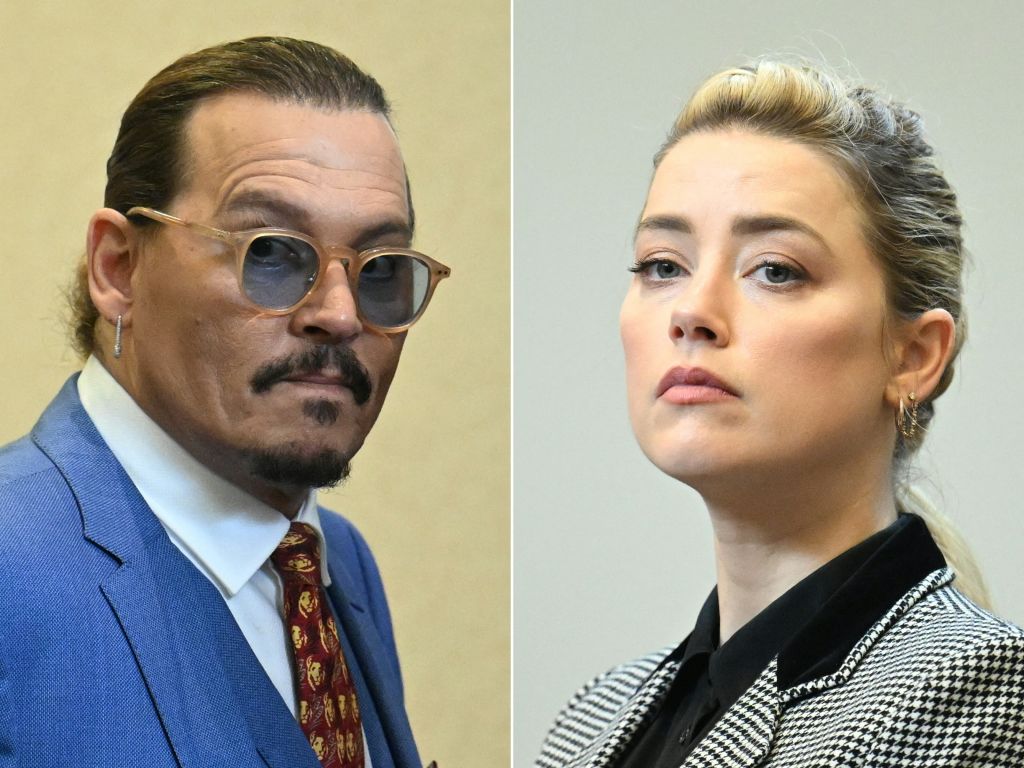
"That was some real solid quality content, some solid quality shit, I was loving it man, absolutely loving it."
Asmongold
That's one of the weird things here. You can't be overly critical of streamers who are responding to an ecosystem that has already decided Depp-Heard is not just a defamation trial, but big business. xQc's job is making people watch him, and people wanted to see this trial.
Some streamers are even more explicit about the appeal. After one of Heard's lawyers gave an animated closing argument, popular streamer Asmongold, who is best-known for World of Warcraft stuff but published more than 85 YouTube videos about the proceedings, said what it meant to him:
"Bro [Heard's lawyer] just went off," said Asmongold. "I was surprised, she just went fucking wild man … it was just schizo ranting but the thing is, that's entertaining ... Bro, like I have to admit I wish that she had acted that way through the entire trial, because this just unhinged, flinging her arms around... That was some real solid quality content, some solid quality shit, I was loving it man, absolutely loving it.
"Johnny was like looking at her and you can just tell, there's a part of him, where she was really impressing him... he's probably thinking damn, this woman's a better actor than Amber... they're gonna cast her in the next Pirates."
Here's some of the thumbnails from his Youtube channel:
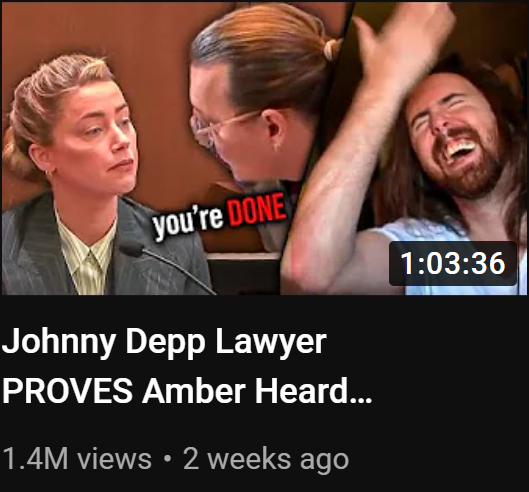
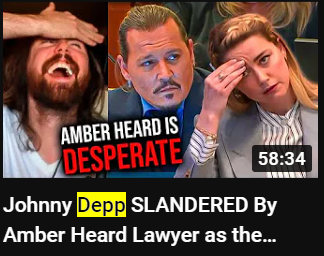
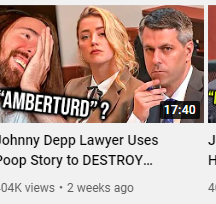
If you go to Asmongold's Twitch channel now, one of the top clips (shorter videos taken from full-length streams, usually by unpaid volunteers) is his reaction to the verdict, where he exclaims, "I can't believe it's fucking happening." Most notable about this clip is the title's choice of focus: "johnny depp wins while asmon almost peaks 460k viewers"
"When Vasquez makes a point that Pokimane herself had raised, the streamer celebrates with chat, as if she'd guessed the end of the movie."
These streamers aren't randoms stumbling across an opportunity: they're some of the most popular and visible faces of the platform's last five years. Take Pokimane, who is as close to Twitch royalty as you get. When I tuned-in to Pokimane's channel, she had about 26,000 viewers, and on the surface it was the least-unpleasant stream I'd encountered so far. Pokimane comes across as a decent person generally and her chat is less of a Pepe-fest. There's an interesting discussion of things like the definition of defamation during the closing arguments, and she doesn't exhibit the same kind of faux-lawyerly grandstanding some others do when covering the same material.
However, even when you get to a 'nicer' streamer, somewhere you'd think that there would be a more respectful atmosphere, things can still get partisan and deeply weird.
Johnny Depp's lawyer Camille Vasquez is beloved by Pokimane's chat, who respond to her closing arguments with declarations about her status as a "QUEEN." There are some very odd moments as Vasquez speaks. When Vasquez makes a point that Pokimane herself had raised, the streamer celebrates with chat, as if she'd guessed the end of the movie. Later in the summation, Pokimane will recreate Depp's pose in a photograph of him sleeping (taken by Heard), encouraging her viewers to screenshot the stream as she slumps in her chair.
Legal Entertainment
"There is room both to acknowledge the value in intelligent commentary while also questioning just where folks were getting their information."
Attorney Richard Hoeg
I don't believe any of these streamers deserve particular scorn for covering a popular topic. But it was striking to me how much of a game it was, how removed the discussion was from the reality of two former lovers raking over their relationship in great detail, and making pretty horrific allegations of abuse against each other. Creating reaction videos to allegations of abuse feels slightly like the Victorian habit of going to the asylum to laugh at its inhabitants.
Among the coverage I watched, it was striking how much misinformation there was. I got used to checking in on the Hoeg Law channel, run by attorney Richard Hoeg, and the LegalBytes channel he frequently guested on during this period, hosted by California/DC attorney Alina "Alyte" Mazeika. This was an interesting case to me because, as well as frequently covering gaming topics, Hoeg's channel is focused on the law and high-profile legal cases: That is, he was always going to cover it. So I asked Hoeg about how he felt seeing wider streamer and influencer culture making entertainment out of a domestic abuse case.
"I agree that portions of the internet do not appear to have approached the Depp v Heard issue with the same concern for intelligent discussion or application of critical thinking/expertise. While I feel strongly that the real good of what we and others did on YouTube and elsewhere, should not be 'thrown out with the bathwater', I do think there is room both to acknowledge the value in intelligent commentary while also questioning just where folks were getting their information."
The type of work Hoeg and Legal Bytes does could be called legal entertainment, and I suppose the distinction I'd draw as a viewer of these things is the obvious point that Hoeg and Alyte are lawyers. That seems to me, if I were super-interested in the Depp-Heard case, an authority that these channels bring to coverage.
There's an element here where the problem, as I see it anyway, isn't so much the individual content creators as the system they're operating in—and what that system will allow. We'll come to Twitch's culpability or otherwise in a moment, but I put it to Hoeg that the legal profession in the US should be grappling with the fact that, in the online age, high-profile trials of this nature are liable to become feeding frenzies.
"I think public trials are overall a good thing, and folks deserve an inside look at how the justice sausage is truly made," Hoeg responds. "As a profession, I think trial lawyers in general can do better to avoid stoking the passions of the internet (as we saw with competing PR statements from both legal teams here), and perhaps celebrity/popular trials should be accompanied by joint statements of the parties before commencement advising 'fans' of proper decorum for such a serious affair. I think there is space to really have great, legally intelligent conversation around such things, and I truly believe that more and better information will ultimately win out."
I wish I shared that kind of optimism. Because if the Depp-Heard trial shows anything, it's that public perception can come to some damning judgements long before a court ever does, and how those perceptions are formed seems to have a lot to do with picking sides and then misrepresenting everything to make your side look better. Some wags might point out that this is, essentially, what lawyers themselves do. But it's an internet speciality.
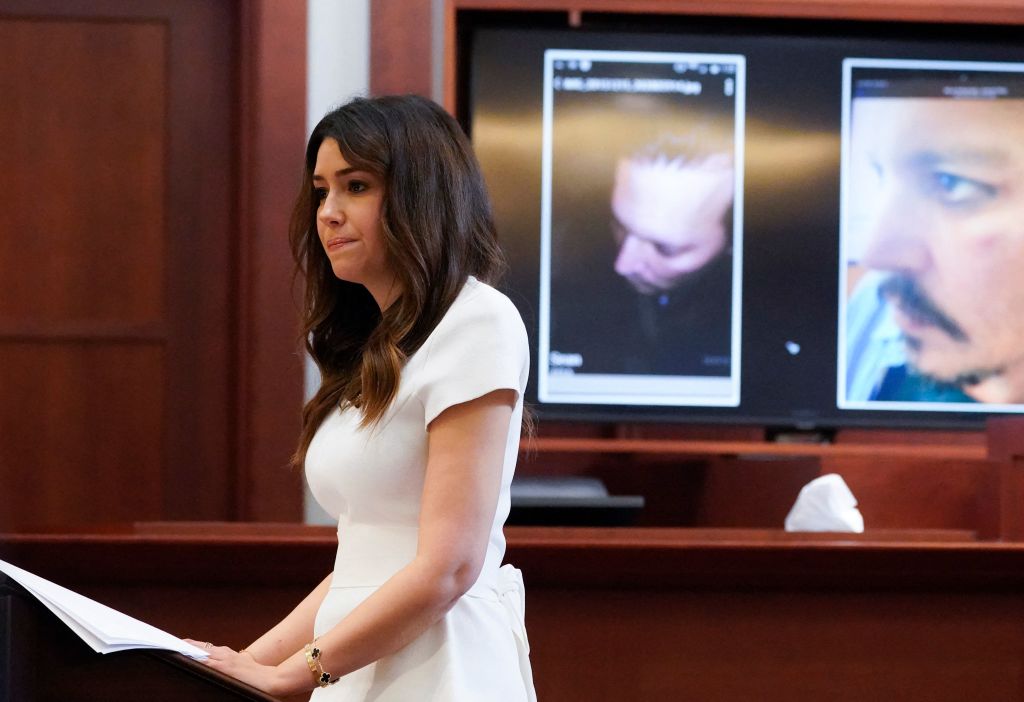
Old, Meet New
"The discussions somewhat blend into the background until, every so often, you remember what this is about."
A coda to my exchange with Hoeg, which happened late last week, is that the Washington Post published an article that attempted to tease-out the differences in coverage between 'old' and 'new' media, while suggesting the 'winners' were content creators who went all-in. The argument was essentially that, without proper standards and accountability, this new information economy is highly dangerous.
In a sign of how treacherous these topics can be, the article is now subject to what is surely one of the all-time great Washington Post corrections. There's an argument that the 'old school' news publications have both fact-checking and an element of procedural transparency about errors. This is not necessarily untrue, but when such publications get it wrong the blowback is understandable and deserved.
The Post's correction admits that it had claimed two 'Internet influencers' had been contacted for comment, but: "In fact, only Mazeika was asked, via Instagram. After the story was published, The Post continued to seek comment from Mazeika via social media and queried ThatUmbrellaGuy for the first time. During that process, The Post removed the incorrect statement from the story but did not note its removal, a violation of our corrections policy."
That is, an article from an august institution criticising the unaccountability of new media was stealth-edited to remove errors. It's not the greatest look.
I watched hours of this stuff and, after a few minutes, it's all-too-easy to find yourself slipping into a kind of passive listening. You're not especially engaged so much as vaguely interested, and the discussions somewhat blend into the background until, every so often, you remember what this is about. You hear an audio recording of Heard calling Depp a "baby"; then there's an account of violence; then there's death threats. It's nasty stuff.
The attention on Depp v Heard has been frequently compared to the OJ Simpson trial, which can feel crass because in that case there were two murdered people at the centre of it. Here, it's two celebrities fighting a defamation battle over their respective allegations of domestic abuse. But there's no denying that a lot of the same dynamics powered the hyper-interest in this: celebrity, domestic abuse, a former icon brought low, allegations of fraud and set-ups. Depp attorney Adam Waldman admitted to communicating with pro-Depp "internet journalists", which feels wrong, but then Johnny Cochrane stood outside the LA court room almost every day spinning OJ Simpson's case.
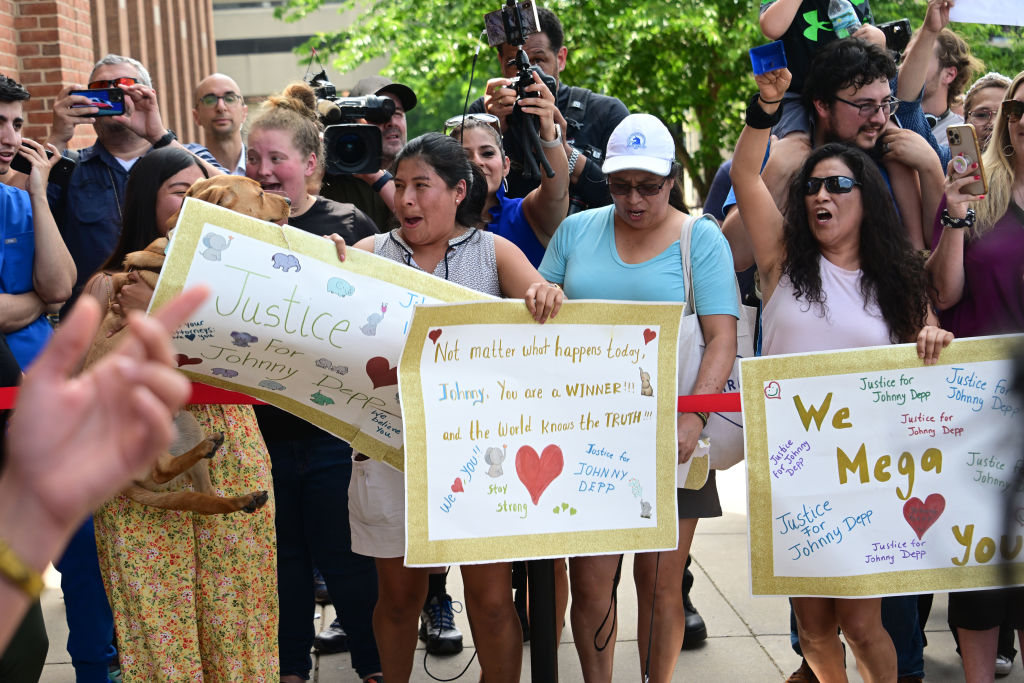
"The years where we pointed fingers at moguls like Rupert Murdoch now feel almost quaint, even though it was yesterday."
Twitch was not alone in being a platform for some loathsome stuff over the period of this trial, but that doesn't excuse it having to answer serious questions either. The big question for me is how the platform may prepare for an event like this in the future, for example another celebrity trial with similar dynamics. Or to put it another way: Is streaming a trial that revolves around allegations of domestic abuse a suitable topic for entertainment?
This is the 'utility vs service' debate that comes with all online media platforms. Do we want Twitch to be a public-access utility, despite not being accountable to the public, or do we want a Trust and Safety team deciding what content is fine and what not? Which Twitch has done in the past: it's almost amusing in this context to remember that, once, non-gaming content on Twitch was a big controversy.
I contacted representatives for Asmongold, xQc, and Pokimane for comment, and will update with any response. I've also asked Twitch whether this is the kind of content it wants to be hosting, and will update with any response.
Depp v Heard is something people will look back on and remember as a media circus, but a new kind, where public opinion was influenced not by a few 24-hour cable news channels, but by hundreds of game streamers and amateur pundits who worked with their audiences to produce continuous streams of the 30-second video clips and partisan editing that defined the meaning of the trial for many. The years where we pointed fingers at moguls like Rupert Murdoch now feel almost quaint, even though it was yesterday.
What happened with Depp-Heard, and the public fascination with it, isn't new. We're all only human, and an awful spectacle is still a spectacle. Gawking is a feature not a bug, but what is new is the way these things are digested and become so pervasive. If the internet mass loves anything it is feeling that the internet had a real-world impact, that it was a part of things. Even if it was just gawking and being awful.
Perhaps that's the most disturbing thing. xQc, Asmongold, Pokimane… these people do it for profit. So does Twitch. You can understand that. The audience does it for free.

Rich is a games journalist with 15 years' experience, beginning his career on Edge magazine before working for a wide range of outlets, including Ars Technica, Eurogamer, GamesRadar+, Gamespot, the Guardian, IGN, the New Statesman, Polygon, and Vice. He was the editor of Kotaku UK, the UK arm of Kotaku, for three years before joining PC Gamer. He is the author of a Brief History of Video Games, a full history of the medium, which the Midwest Book Review described as "[a] must-read for serious minded game historians and curious video game connoisseurs alike."

